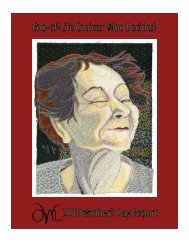elder abuse: a women's issue - OWL-National Older Women's League
elder abuse: a women's issue - OWL-National Older Women's League
elder abuse: a women's issue - OWL-National Older Women's League
Create successful ePaper yourself
Turn your PDF publications into a flip-book with our unique Google optimized e-Paper software.
safety checks that prevent medication errors.Inappropriate drug use is fraught with dire healthconsequences. Patients seek medical care for symptomsthat appear to be associated with a disease process, butwhich are actually side-effects of drugs the physicianmay or may not know the patient is taking. Unnecessaryside-effects can mimic conditions such as Alzheimer’s,dementia, and scores of other diseases and diagnoses,leading to the prescribing of even more medications, moreside-effects, and more medication-related problems. Acascade of events ensues in which new medications areprescribed for symptoms which are side-effects of othermedications. Physicians may not be aware of the numberand dosage of pharmaceuticals, prescription and nonprescriptionitems in use. A sudden new symptom canbe terrifying to patients and caregivers, and some fail toreport new symptoms like memory loss or confusion,fearing a diagnosis of dementia, displacement from theirhomes and loved ones, or further dependence on theircaregivers.The increasingly widespread availability of nonprescriptiondrugs, herbals, and alternative healthproducts contributes to yet another set of medicationmisadventures. The availability of non-prescriptionproducts in grocery and convenience stores as wellas in pharmacies fosters the impression that they areinnocuous and can be used indiscriminately. Many ofthese substances are potent pharmaceuticals in theirown right and can interact with non-prescriptionsubstances and prescription medications alike. Fewof these products are available in computerized drugsafety check programs that scan for medication-relatedproblems. When the legal drugs, alcohol, caffeine,tobacco and home remedies are factored in, the numberof potentially interactive products that persons put intheir bodies can be astounding, and may rise to thelevel of self-neglect. Each of these affects the others, andevaluation of medications and other substances that aperson is taking should be evaluated before any newdrug is introduced.Another factor in medication-related complicationsis the errors that can occur at every level of patientcare. Patients and caregivers may misunderstand thedoctor’s instructions, and discontinue the wrongdrug or double the dose of another. The physician,unaware of the noncompliance, can increase doses orchange drugs believing the disease is not respondingto treatment. Overdoses are common when differentdoctors unknowingly prescribe the same or similardrugs, which may have different names depending on ifthey are brand name, generic, or over the counter, evenwhen they are in the same class of drugs. Variations onthese themes are endless, but the results are the same,and accidental or intentional misuse of medications canbe deadly.Any addition of a new prescription should be assessedin the context of total medication use. If side-effectsoccur, or if there is a change in the level of functioningof the patient, a new medication assessment should beperformed. The key lies in the empowerment of patients,families, caregivers and communities for prevention.Patients must become aware that the indiscriminate useof medicinal products, no matter how well-intentioned,can endanger health. They must have the tools tomanage and prevent this occurrence.It is possible for people administering medications,both in the home and in institutional settings, to usemedications to subdue or control. If intentional, thiscertainly rises to the level of <strong>abuse</strong>. If unintentional,it could still be considered neglectful. Patients andcaregivers need to be aware to consult their physician if amedication regimen seems inadequate or inappropriate.Prescription medications should be dosed exactly asthe physician ordered, and doses should not be alteredfor any reason without a physician’s recommendation.Likewise, the use of the legal drug of alcohol or illicitdrugs of any kind to control comes under the headingof intentional <strong>abuse</strong>. Mental health counseling, respitecare, and support counseling can be effective in many ofthese cases and should be explored.The current health care system pays billions foremergency room visits and hospitalizations but hasfailed to implement a widespread practice to coverservices that could prevent those events for medicationrelatedincidents. Community initiatives are urgentlyneeded, especially in older populations, and patientsmust be taught how to protect themselves and theirfamilies. By not responding to these critical needs insuch a large segment of our population, the system itselfis participating in and perpetuating neglect.30



